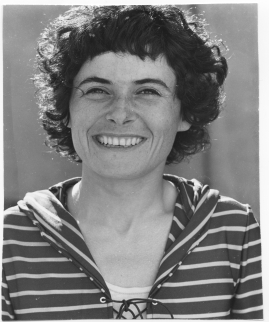Maj Wechselmann
Table of contents
- Basic facts
- Links and resources
- Biography
- Awards
- Films
- Original work
- Soundtrack listing
- Groups
Basic facts
Media (1)
| Director |
|
|---|---|
| Screenplay |
|
| Show all films | |
| Awards |
|
Biography
Danish-Swedish director and writer. Born in Copenhagen.-To date Maj Wechselmann has made 45 films, mainly documentaries, often at breakneck speed and often straight after a political decision has been taken or an event has occurred which she feels the need to examine. She is a director whose films are infused with social pathos and border on journalistic reporting. She often throws the spotlight onto other aspects of a situational whole than those that the media, for various reasons, usually focuses on.Wechselmann made her breakthrough in 1972...
Links and resources
Biography
Danish-Swedish director and writer. Born in Copenhagen.
-
To date Maj Wechselmann has made 45 films, mainly documentaries, often at breakneck speed and often straight after a political decision has been taken or an event has occurred which she feels the need to examine. She is a director whose films are infused with social pathos and border on journalistic reporting. She often throws the spotlight onto other aspects of a situational whole than those that the media, for various reasons, usually focuses on.
Wechselmann made her breakthrough in 1972 with Viggen 37, a film that provoked widespread debate about the complexities of the defence industry, Sweden's defence costs and about how the film itself actually got made. The film was well received by the critics, winning the Swedish Film Critics' award for best film in 1973 and the Kurt Linder Stipendium in the same year.
Her films are often made from a female point of view, such as Flickor på Marabou ('Girls at Marabou,' 1971), which centres on young women, often from Finland, and their low paid work on production lines. Tala med mig systrar! ('Speak to Me, Sisters!,' 1999) is about the struggle against apartheid in South Africa from a woman's perspective, and De tatuerade mammorna ('The Tattooed Mothers,' 2003) looks at three young mothers in El Salvador who are struggling to extricate themselves from a young criminal gang. Most of her films examine trouble spots in various parts of the world such as Iraq, Palestine or South America, focusing on injustices, environmental destruction or war. Far from being ingratiating, she has often been criticised for her left-wing political sympathies and her sceptical stance towards western capitalism.
In 2006 Wechselmann made Bang and the History of the World (Bang och världshistorien), a film about the journalist Barbro Alving which took her a considerable time to make and which provides a multifaceted picture of the pioneering foreign correspondent Alving ("Bang" as she signed herself in her columns). An earlier character portrait was Filmen om Anton Nilson. Till arbetarklassens barn ('The Film about Anton Nilsson. To the Children of the Working Class,' 1980) about one of the last Swedes to be sentenced to death, for the bomb attack in Malmö in 1908 against the ship Amalthea, which at the time was home to British strike-breakers brought in to work at the shipyards where the Swedish workers had gone on strike. Nilsson was to have been guillotined, but was eventually pardoned and went on to become a reconnaissance pilot for the Red Army in the Soviet Union shortly after the Russian revolution.
Wechselmannn has also made a small number of fictional films such as Hungermarschen ('The Hunger March,' 1982) about the working class' struggle for survival, and Hitler and We in Clamping Street (Hitler och vi på Klamparegatan, 1997) about the struggle against Nazism in the 1930s.
As a writer her publications have included "Det är upp till dig!: om olja, folkmord och dina pengar" ('It’s Up to You!: About Oil, Genocide and Your Money,' 2011) and "Kärnkraft - farlig och förlegad" (-Nuclear Power - Dangerous and Outmoded,' 2013). She has also written a number of debate articles, often about subjects that she has gone on to explore further in her films.
Wechselmann's pugnacity not only finds expression in words and film. In 1988, in one of the first legal cases about online defamation in Sweden, she won damages against a person who was deemed to have falsely designated her as a traitor and Soviet spy.
In 2006 Maj Wechselmann was awarded the Glass Statue Award by Sveriges Förenade Filmstudios with the motivation "With your bravery and uncompromising approach you are a necessary tonic in the world of Swedish film."
Marika Junström (2014)
(translated by Derek Jones)
Awards
| Prize | Varberg | 2011 | Jan Myrdals stora pris - Leninpriset | ||
|---|---|---|---|---|---|
| SFF's Glas Statuette (Sweden) | Stockholm | 2006 | (Glasstatyetten. Juryns motivering:"Med ditt mod och din kompromisslöshet är du ett nödvändigt salt i den svenska filmvärlden." | ||
| Prize | 2005 | (Lena Hellmans minnespris/Lena Hellman's Memory Prize) | |||
| 2000 | (Gelsted-Kirk-Scherfig-priset delat med Stine Korst) | ||||
| 1999 | (Hyltebruks Olof Palme-pris för yttrandefriheten/The Olof Palme Award of Free Speech) | ||||
| Festival Award | Berlin | 1999 | (ekumeniska juryns pris på 5.000 DM för bästa film i sektionen Panorama) | ||
| Prize | 1997 | (Den Gyllene Pennan/The Golden Pen) | |||
| 1997 | (Landsorganisationens kulturpris) | ||||
| 1996 | (Sjöfolkförbundets kulturpris) | ||||
| Stockholm | 1993 | (1992 års José Martí-pris från Svensk-Kubanska Föreningen) | |||
| Rydö | 1990 | (Rydöpriset - "för den fria tanken till Olof Palmes minne"; 10.000 kr) | |||
| 1980 | (Vilhelm Mobergs pris för kritisk journalistik) | ||||
| The Kurt Linder Grant | Stockholm | 1973 |


